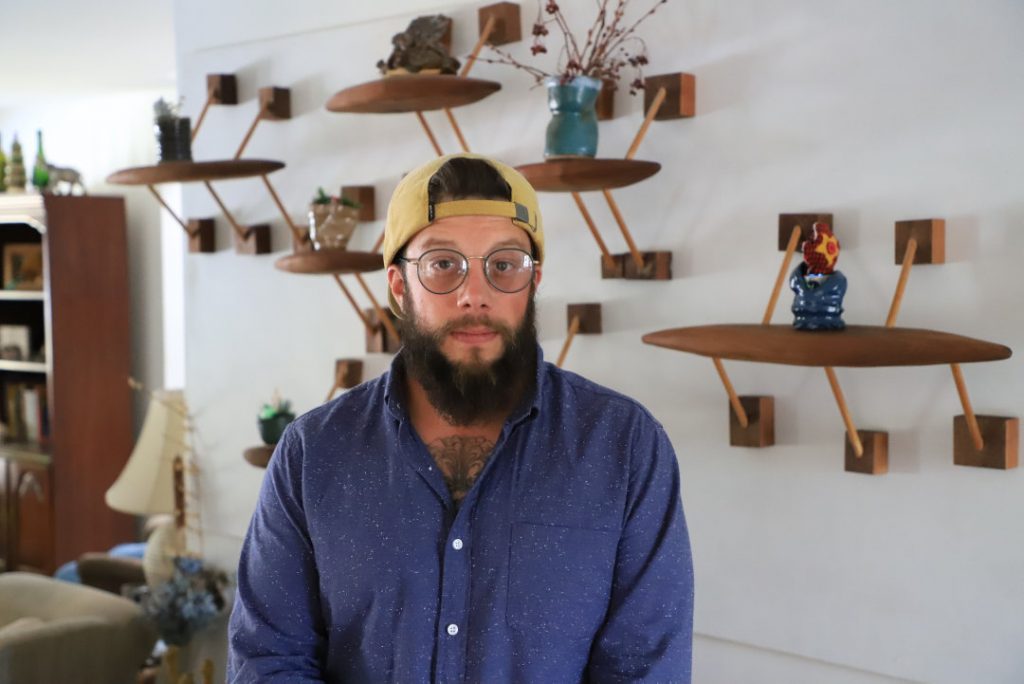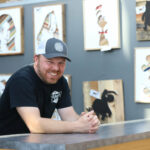 Oliver Pettinato is a local wood worker who looks at normal, everyday objects in unusual ways. With a family history of 50-plus years in construction, he didn’t realize he would eventually follow the family path until after exploring many other interests. He is a 2004 graduate of Abington Heights High School and received a degree in fine arts and craft from Kutztown University, where he also had a minor in sculpture. He lives in South Abington Twp.
Oliver Pettinato is a local wood worker who looks at normal, everyday objects in unusual ways. With a family history of 50-plus years in construction, he didn’t realize he would eventually follow the family path until after exploring many other interests. He is a 2004 graduate of Abington Heights High School and received a degree in fine arts and craft from Kutztown University, where he also had a minor in sculpture. He lives in South Abington Twp.
Meet Oliver Pettinato…
Tell me about your background in the woodworking industry.
My family has been in the construction industry for more than 50 years. Our business was recently sold. My creative process started when I was quite young. It started as the way I used to organize things. I remember walking home from someone’s house in grade school one time and it started raining. Someone was draining their pool, and there were these stones that were awfully organized and the water was splashing everywhere. I spent the next hour giving that water a better path, and organizing the rocks. I guess how things look caught my attention from a young age. I started doing ceramics around age 12, and that was my first medium or process of how to come out with 3-D form. Getting to know a process is where I really enjoy the presence of the material. As much as I want an outcome, kind of like with the rocks, I enjoy organizing it in some way. If everyone thought it looked silly, I’d still be happy if I enjoyed putting it together.
Did you always know you’d end up in your family business?
I was going to study architecture. I don’t know what made me get cold feet with it, but I did. I basically changed my portfolio to fine art and wanted to concentrate in ceramics. I didn’t recognize that I wanted to work with wood until I saw some of the studios. I don’t know if it has to do with my family’s background in construction or my soul wanted to be around building. I want to build things that are classy with the process but avant-garde in what I bring out of the material.
How did you learn the craft of wood? Were there any specific people who influenced you?
Absolutely. My grandfather and my father but also my professors Dave Rogers, Phoebe Adams, Lyn Godley and Jack Larimore. I went to Kutztown University, and that’s where I met quite a few really inspiring professors. There is a handful more.
 What was it like to learn from your father and grandfather?
What was it like to learn from your father and grandfather?
It was definitely my choice, and I also kind of felt obligated. Union life is great, but I felt like I owed my father and grandfather. I enjoyed doing it and wanted to see where and how hard they had to work to get to where they are. I wanted to understand, and I feel like working with them now and continuing to learn is giving back to them, plus helping the business (before recently closing it). We spend so much time working together, and some people don’t get to spend as much time as they’d like with their family or friends.
Describe your style as an artist.
To a certain degree, my style has to do with a stream of conscious in a weird, physical sense, why we react to emotions. Not to be overly cliche, because obviously art is an expression, but the way I try to manipulate the material — if it’s wood, plastic, metal, plastic, whatever it may be — I take it seriously. I try to capture youthfulness in a sense, even if it’s a dark and a heavy product. It does seem like my humor what you would assume the object is trying to get across. It might be completely opposite. I feel like all artists are trying to capture a glimpse of of everyone’s consciousness and let the viewer into our realm or skewed perspective on things. I want people to just believe in thinking. I want the viewer to be entertained in a sense that you’re either blown away or disgusted and have a fresh mind. Don’t doubt the art world, because it helps people with mental issues and is a much bigger functioning animal that we undercut sometimes. It’s challenging for the most part because everyone kind of gets stuck in one line of thought. Art is important because it pushes us to think in other ways.The art world is just as aware and present as it’s always been.
What artists, topics or subjects inspire you?
Just the desire to keep trying is really awesome and inspirational, especially in an area like Northeastern Pennsylvania. There are only a handful of people who are lucratively making money, but they’re also outsourcing themselves. It’s not like they’re only selling work in the area, but they’re adapting. That’s one of the first lessons you learn after you get out of undergrad or graduate school in any field. If you can’t swim, you’ll probably sink. Plant life gives me great inspiration. The spontaneity of letting your hand do something that you’re not controlling in a sense. You’re controlling it the way you want, but I enjoy random shape-making besides just looking at landscapes. I really like landscape painting and anything hyper-realistic. Conceptual art is something I’ve dabbled in, but it’s difficult because it’s all about your artist statement, or assumptions; it doesn’t have to do with much form. I like to keep both interacting with one another.
 What is the best part about being an artist in a small town?
What is the best part about being an artist in a small town?
I’ve met really excellent people. We did a couple pop-up shows in the area about five years ago, and at the time, that was something that the area really hadn’t seen. It was just trying to reactivate a community or taking something rundown and giving it a beautiful contrast of the ugly being something that could be so great if you look at it differently.
What other hobbies or interests do you have?
I enjoy working out, mountain biking, water skiing and wake boarding. I like anything outdoors. I own a home, so I have house projects I’m always working on. That falls into my career, hobby and talent.
What is the best advice or a gesture you’ve received that has stuck with you?
My professors and teachers did a good job pushing me. What they did worked. I’m still interested even though I’m not uber famous. My mother and father have supported me this whole time. One of my professors, Phoebe Adams, said, “Don’t ever assume anything. Anything.” I definitely keep that in mind when something doesn’t go the way I thought or hoped.

Emma Black is a photographer and writes Up Close and Personal, which spotlights people from all walks of life in NEPA who have a unique skill, craft, talent or trade. She is a graduate of Abington Heights High School and University of Scranton, where she studied journalism and electronic media. Emma has been with Times-Shamrock Communications since 2016 and enjoys playing, coaching and following soccer; exploring international cuisine; and doing arts and crafts in her free time. Contact: eblack@timesshamrock.com; 570-348-9100; @emmablack_13




